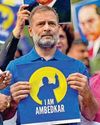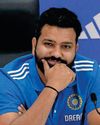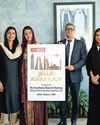
Age no bar, cartilage no bar. Rohan Bopanna, at age 43—or level 43 as he likes to call it—became the oldest man to win a Grand Slam when he and partner Matthew Ebden won the Australian Open earlier this year. Not only was the feat impressive in itself, the fact that he did so with no cartilage in his knees made it an insane achievement.
There was a time in 2006 when, following a shoulder surgery, Bopanna wondered if he would ever compete again. Nearly two decades later, he is world No. 1 in men’s doubles and has his sights set on the Paris Olympics.
It was this journey of grit and persistence that Bopanna shared with THE WEEK’s Sports Consultant Ayaz Memon at the magazine’s Sportsroom event presented by HSBC at the bank’s India headquarters in Fort, Mumbai, on April 4.
As the stories swirled inside the colonial-era art deco building, the audience got a peek into not just Bopanna’s life, but also that of Indian tennis as a whole. The conversation—breezy and insightful—covered a lot of ground, including why there is a paucity of talent in Indian tennis currently, how Iyengar yoga and ice baths kept his body going, his love of coffee and exploring cities, the loneliness of travel, and how he came back from the dark days of his career.
As it turned out, he is proficient not only with racket in hand, but also on the mic. Sitting on stage in a light-blue jacket, wearing a gold locket with two crossed knives—a nod to his Coorgi roots—Bopanna talked about how he went from being a young singles player to a grizzled doubles veteran who is now like an uncle on the international circuit.
Denne historien er fra April 21, 2024-utgaven av THE WEEK India.
Start din 7-dagers gratis prøveperiode på Magzter GOLD for å få tilgang til tusenvis av utvalgte premiumhistorier og 9000+ magasiner og aviser.
Allerede abonnent ? Logg på
Denne historien er fra April 21, 2024-utgaven av THE WEEK India.
Start din 7-dagers gratis prøveperiode på Magzter GOLD for å få tilgang til tusenvis av utvalgte premiumhistorier og 9000+ magasiner og aviser.
Allerede abonnent? Logg på

Lessons in leadership
When I began my career at Hindustan Lever (as HUL was then called), I was deeply inspired by our chairman, Dr Ashok S. Ganguly.

Political colours
One of the greatest fashion statements of recent times was made in the Parliament's winter session by Rahul Gandhi and some opposition colleagues. India's most news-making politician (since his landmark Bharat Jodo Yatra) gave up his signature white polo T-shirt for a blue one.

Chat roam
Vox pop content is seeing an uptick in India, with creators making conversations on current and social issues fun and funny

Back home with BANNG
Michelin star-winning chef Garima Arora, who recently opened her first restaurant in India, on all things food and family

One supercalifragilisticexpialidocious New Year
Once Christmas is over, tension mounts in our home as the little woman and I start ticking off the days. We both remain on edge because we dread the coming of the New Year—a time when the whole world goes crazy and adopts resolutions. We, too, make New Year promises and our ‘list of past resolutions’ is very long and impressive. Unfortunately, we are complete failures at keeping them and our ‘list of resolutions not kept’ is equally long and equally impressive.

Six or out?
Cricket is a quasi-religion in India. And our pantheon of cricketers is worshipped with a fervour bordering on hysteria.

DOWN AND UNDER THE WEATHER
After their flop show in Australia, Virat Kohli and Rohit Sharma will have to live on current form rather than past glory

The new in news
THE WEEK and DataLEADS partner to revolutionise news with fact-checks, data and Live Journalism

Hello Middle East
Reem Al-Hashimy, UAE minister of state for international cooperation, inaugurates a special Middle East section on THE WEEK website

BAIT CLICK
Dark patterns fool millions of Indians every day. The government is finally acting, but it just may not be enough